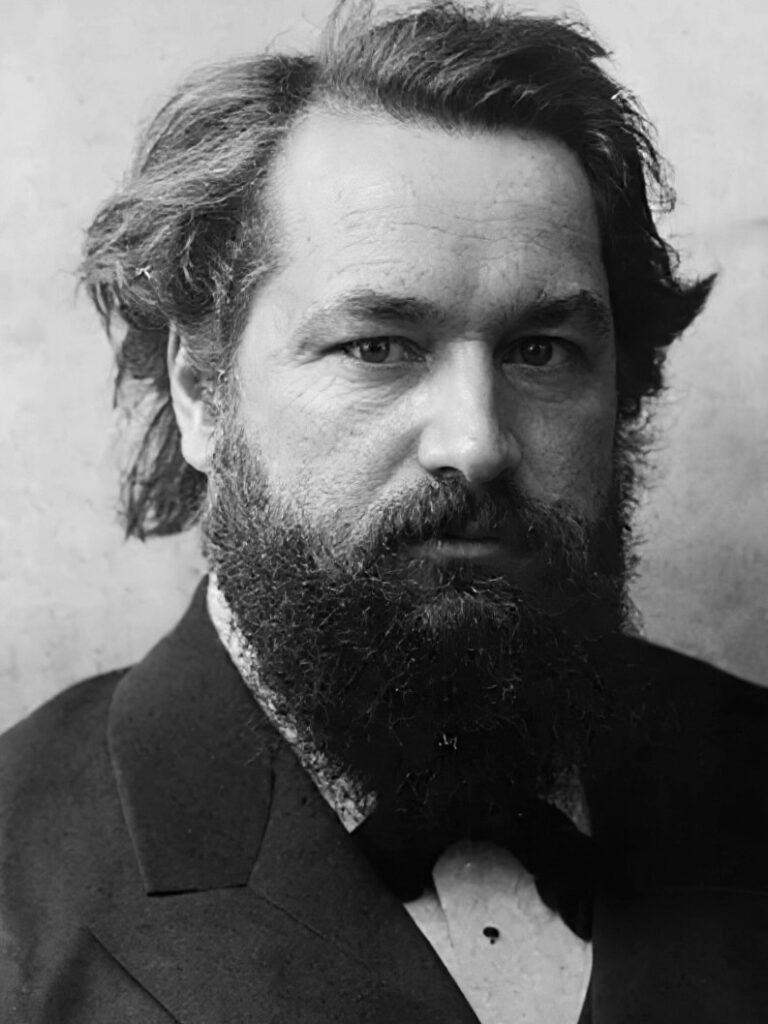Sergei Korsakoff

Sergei Sergeievich Korsakoff (1854-1900) Серге́й Серге́евич Ко́рсаков was a Russian psychiatrist.
Sergei Korsakoff was a seminal figure in Russian neuropsychiatry, renowned for his detailed characterization of memory disorders and his humane, holistic approach to mental health. Born on January 22, 1853, on the Gus estate in Vladimirsk, Russia, he studied medicine at Moscow University, graduating in 1875. He began clinical work at the Preobrazhenskii mental hospital, training under Aleksei Yakovlevich Kozhevnikov (1836–1902).
Korsakoff’s early postgraduate years were marked by training in neurology and exposure to international leaders such as Theodor Meynert (1833–1892) in Vienna. His 1887 thesis on Alcoholic Paralysis established his lifelong focus on the intersection of peripheral neuropathy and cognitive disturbance.
By the 1890s, Korsakoff had become professor extraordinarius and head of a newly established university psychiatric clinic. He was recognized not only for his academic rigor but for his emphasis on compassionate care, opposing mechanical restraints in psychiatric institutions. His contributions to medical education, notably a standard Russian psychiatry textbook, and his organisation of the 12th International Medical Congress in Moscow in 1897, reinforced his national prominence. He died prematurely on May 1, 1900, just before launching a national society for psychiatry and neurology.
Biography
- Born January 22, 1853, Gus estate, Vladimirsk province, Russia
- 1875 – Graduated in medicine from Moscow University
- 1876–1879 – Postgraduate work under A.Ya. Kozhevnikov (1836–1902)
- 1887 – Doctoral thesis Ob alkogolnom paralichie (“On Alcoholic Paralysis”)
- 1888 – Appointed Privatdozent
- 1890 – Published Diseased Disturbances of Memory and their Diagnosis; Founded the Moscow Society of Neuropathologists and Psychiatrists
- 1892 – Became professor extraordinarius and head of psychiatric clinic
- 1897 – Organised the 12th International Medical Congress of Neuropathologists and Psychiatrists, held in Moscow
- 1899 – Promoted to ordinarius (full professor) of psychiatry and neurology
- Died May 1, 1900 Moscow
Medical Eponyms
Korsakoff Syndrome (KS)
An amnestic disorder marked by severe anterograde and retrograde amnesia, confabulation, and apathy, typically secondary to thiamine deficiency from chronic alcoholism.
A chronic, amnestic neuropsychiatric condition. Characterised by profound anterograde amnesia, varying retrograde memory loss, confabulation, and relative preservation of other cognitive functions.
Classically follows untreated Wernicke encephalopathy, but may also develop insidiously. Pathologically linked to thalamic and mammillary body damage due to thiamine deficiency.
Some authors emphasise non-alcoholic causes of KS (e.g. hyperemesis gravidarum, cancer cachexia), in line with Korsakoff’s original broader view.
First described by Sergey Korsakoff in 1887–1889 as psychosis polyneuritica and later cerebropathia psychica toxaemica:
The patient is incapable of recording conversations… forgets everything just said, but speaks of past events as though they are current.
Wernicke–Korsakoff Syndrome (WKS)
An umbrella term combining Wernicke encephalopathy (acute) and Korsakoff syndrome (chronic). Reflects the continuum of thiamine-deficiency-related brain damage.
While Wernicke encephalopathy is potentially reversible, progression to Korsakoff syndrome implies chronic impairment.
Modern usage recognises WKS as a dual-phase disorder—early diagnosis and thiamine repletion may prevent the chronic stage.
Korsakoff’s Psychosis
Historical term, often synonymous with Korsakoff syndrome. Emphasised the psychiatric presentation of amnesia and confabulation.
Originated in Korsakoff’s framing of the syndrome in the context of polyneuropathy, not limited to alcoholism:
The same cause affecting the peripheral nerves may also affect certain areas of the central nervous system.
| Term | Phase | Symptoms | Relation to Alcohol | Pathophysiology |
|---|---|---|---|---|
| Wernicke encephalopathy | Acute | Confusion, ataxia, ophthalmoplegia | Strongly associated | Mammillary body, thalamic and periaqueductal damage |
| Korsakoff syndrome | Chronic | Anterograde amnesia, confabulation | Often follows WE | Thalamic & mammillary degeneration |
| Wernicke–Korsakoff syndrome | Both | Combined spectrum | Alcoholism, vomiting, starvation, etc. | Thiamine deficiency neuropathology |
| Korsakoff’s psychosis | Chronic | Historical term for KS | Alcohol + systemic illness | Same as KS |
Key Medical Attributions
Humane Psychiatry
Korsakoff implemented a “no restraint” policy in psychiatric wards, advocating for greater doctor attentiveness and emotional engagement. He believed in education as a transformative force and opposed the material struggles faced by students, actively aiding them through a dedicated support society.
Major Publications
- Korsakoff SS. Об алкогольном параличе [On alcoholic paralysis]. Doctoral dissertation, Moscow. 1887
- Korsakoff SS. Eine psychische Störung combinirt mit multipler Neuritis (Psychosis polyneuritica seu Cerebropathia psychica toxaemica) [Psychic disorder in conjunction with multiple neuritis]. Allgemeine Zeitschrift für Psychiatrie 1890; 46: 475–485 [also Medizinskoje Obozrenije 1889; 31(13)]
- Korsakov SS. Étude médico-psychologique sur une forme des maladies de la mémoire. Revue Philosophique 1889; 28: 501–530. [Trans. Banks W, Karam SJ. Medico-psychological study of memory disorder. Consciousness and Cognition 1996; 5: 2–21]
- Korsakoff SS. Über eine besondere Form psychischer Störung kombiniert mit multipler Neuritis. Archiv für Psychiatrie und Nervenkrankheiten 1890; 21: 669–704
- Korsakoff SS. Über Erinnerungsstörungen (Pseudoreminiszenzen) bei polyneuritischen Psychosen. Allgemeine Zeitschrift für Psychiatrie 1891; 47
References
Biography
- Vein A. Sergey Sergeevich Korsakov (1854–1900). J Neurol. 2009; 256(10): 1782–1783.
Eponymous terms
- Jelliffe SJ. The alcoholic psychoses. Chronic alcoholic delirium (Korsakoff’s psychosis). 1908
- Ovsyannikov SA, Ovsyannikov AS. Sergey S. Korsakov and the beginning of Russian psychiatry. J Hist Neurosci. 2007; 16(1-2): 58-64.
- Veijn AA. The Moscow Clinic for Nervous Diseases – Walking Along the Portraits. J Hist Neurosci. 2007; 16(1-2): 42-57.

eponym
the person behind the name
BA MA (Oxon) MBChB (Edin) FACEM FFSEM. Emergency physician, Sir Charles Gairdner Hospital. Passion for rugby; medical history; medical education; and asynchronous learning #FOAMed evangelist. Co-founder and CTO of Life in the Fast lane | On Call: Principles and Protocol 4e| Eponyms | Books |
